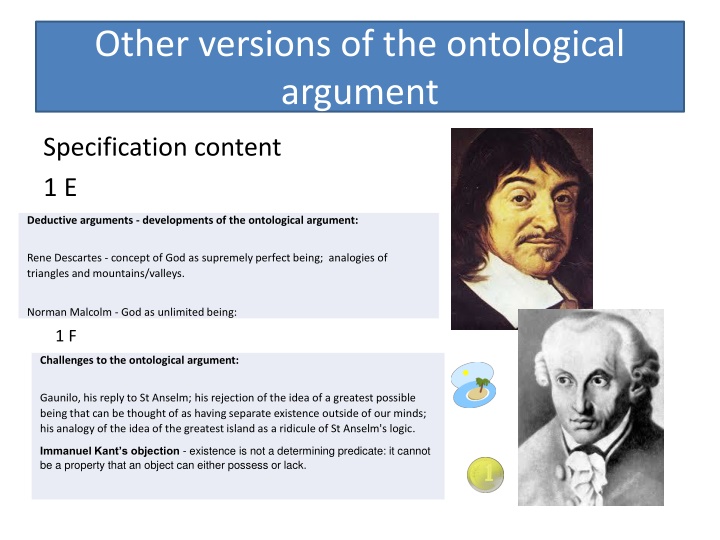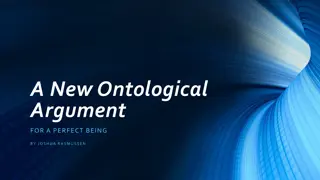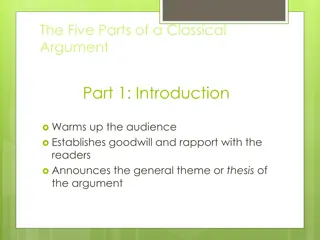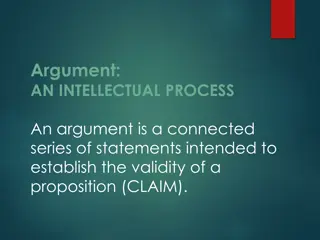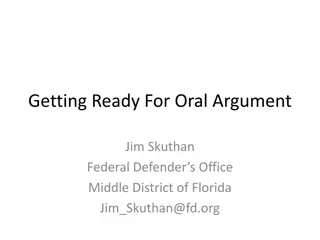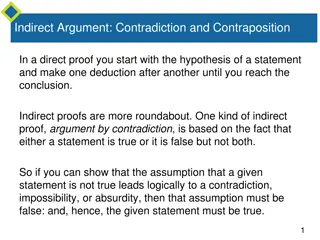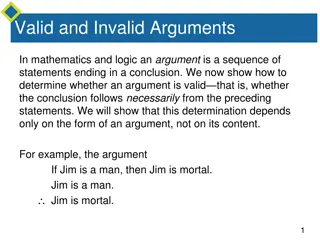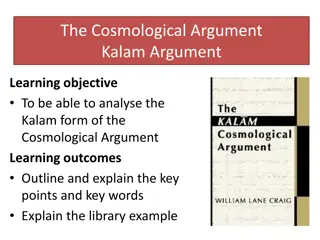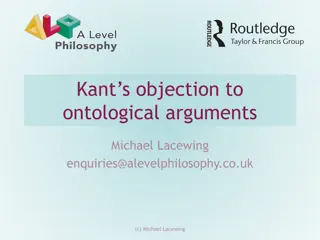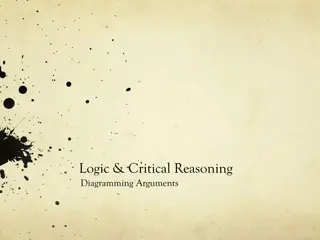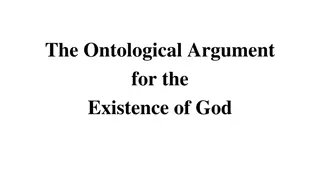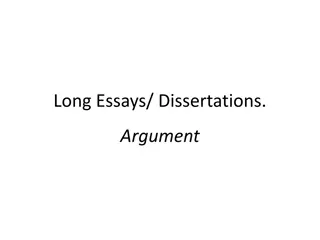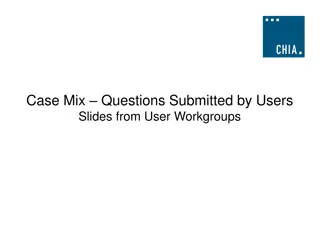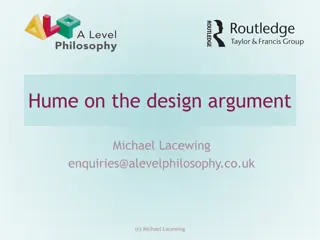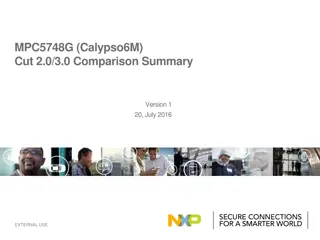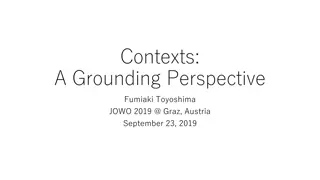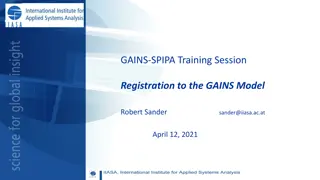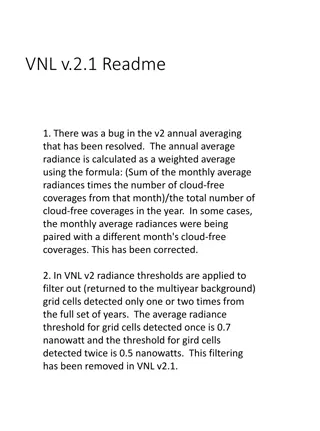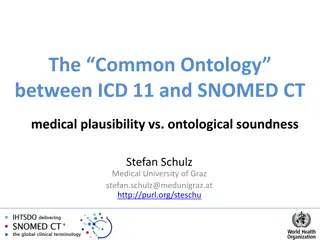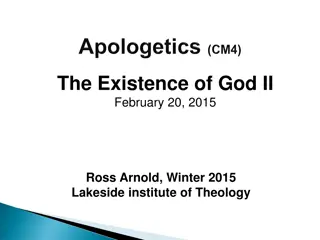Exploring Various Versions of the Ontological Argument
This content delves into different versions of the ontological argument, including developments by philosophers like Rene Descartes and challenges posed by Gaunilo and Immanuel Kant. An exploration of the concept of God as a supremely perfect being is presented, along with key arguments and objections to the ontological proof of God's existence.
Download Presentation

Please find below an Image/Link to download the presentation.
The content on the website is provided AS IS for your information and personal use only. It may not be sold, licensed, or shared on other websites without obtaining consent from the author.If you encounter any issues during the download, it is possible that the publisher has removed the file from their server.
You are allowed to download the files provided on this website for personal or commercial use, subject to the condition that they are used lawfully. All files are the property of their respective owners.
The content on the website is provided AS IS for your information and personal use only. It may not be sold, licensed, or shared on other websites without obtaining consent from the author.
E N D
Presentation Transcript
Other versions of the ontological argument Specification content 1 E Deductive arguments - developments of the ontological argument: Rene Descartes - concept of God as supremely perfect being; analogies of triangles and mountains/valleys. Norman Malcolm - God as unlimited being: 1 F Challenges to the ontological argument: Gaunilo, his reply to St Anselm; his rejection of the idea of a greatest possible being that can be thought of as having separate existence outside of our minds; his analogy of the idea of the greatest island as a ridicule of St Anselm's logic. Immanuel Kant s objection - existence is not a determining predicate: it cannot be a property that an object can either possess or lack.
Recap 1. Why does Anselm think the atheist is a fool ? If they accept the idea of God but deny his actual existence, they are involved in a blatant contradiction, a contradiction as obvious as the denial that triangles are three-sided figures. They are denying what is implied in the idea of the greatest conceivable being that this being must exist
Rene Descartes Descartes adds to Anselm s argument Rationalist philosopher What does this mean? Wanted to prove God s existence with reason alone I think therefore I am He could rationally think of his own existence and this was good evidence of his existence. He could also think of the existence of the supremelyperfect being . . .
Descartes ontological argument Write out Descartes argument key words, premises and examples I think, therefore I am This means . . .
Complete a diagram to demonstrate Descartes ideas God is a supremely perfect being The notion of a perfect being is innate as we can conceive of a perfect being without being perfect ourselves the idea must come from somewhere. Part of the quality (predicate) of perfection is existence just the same as omnipotence, omniscience are also predicates of God s perfection. God cannot lack existence otherwise God would not be perfect. A predicate adds qualities to the subject. Therefore existence adds qualities to the perfection of God. Not a perfect being Thinking of a perfect being
Descartes and the Triangle Descartes illustrates this with an example A triangle needs three sides A mountain has a valley God requires that He exists. Trying to imagine God without the predicate of existence is illogical, like trying to imagine a triangle without three sides. These facts do not require empirical proofs in order for them to be truths (that's why it is an a priori argument) This makes them analytic statements (meaning is within the statement).
Descartes overview Descartes distinguished between a thing s essence and its __________. He argued it was possible to determine what the essential _________ of something was (its essence) independently of knowing whether it existed. He used the illustration of a _________ whose essence was three ________ that added up to 180 degrees. The idea of the triangle could not be separated from the idea of the three angles. However that does not demand that triangles actually ________. However, as Descartes could conceive of his own existence, he could also conceive of the existence of a perfect being. When he considered the idea of a __________ _____ being, he argued that existence was an aspect of ________. In other words, the idea of a supremely perfect being was the unique case where existence was part of its ________, and therefore demanded that such a being existed. 1. I _______ 2. In my mind I have the _________ of a supremely perfect being 2. Existence is a perfection, so existence is part of its essence 4. A supremely perfect being must exist in order to be supremely perfect 5. ___________, a supremely perfect being exists Triangle, exist, supremely perfect, nature, essence, existence, angles, concept, perfection, exist, Therefore
Descartes overview Descartes distinguished between a thing s essence and its existence. He argued it was possible to determine what the essential nature of something was (its essence) independently of knowing whether it existed. He used the illustration of a triangle whose essence was three angles that added up to 180 degrees. The idea of the triangle could not be separated from the idea of the three angles. However that does not demand that triangles actually exist. However, as Descartes could conceive of his own existence, he could also conceive of the existence of a perfect being. When he considered the idea of a supremely perfect being, he argued that existence was an aspect of perfection. In other words, the idea of a supremely perfect being was the unique case where existence was part of its essence, and therefore demanded that such a being existed. 1. I exist 2. In my mind I have the concept of a supremely perfect being 3. Existence is a perfection, so existence is part of its essence 4. A supremely perfect being must exist in order to be supremely perfect 5. Therefore, a supremely perfect being exists
RecapSummary of Anselm Make a list of key terms associated with the Ontological Argument Create a nine square grid Analytic Deductive A priori Anselm TTWNGCBK De dicto (by definition) In re In intellectu Fool Painter Gaunilo Island Parody Descartes Rationalist SPB Triangle Mountain
Kant challenged Descartes view that Gods existence was a necessary predicate. He said: Existence is not a real predicate. It does not add anything to the concept. Criticism centres around first and second order predicates. The first order predicates tell us about the nature of something e.g. the cat is black . Second order predicates tell us about concepts e.g. there are lots of cats . Second order predicate First order predicate It is argued that Anselm and Descartes wrongly defined existence as a first order predicate when it really is a second-order predicate. Existence is the property of a concept not of an object. Existence is not something that can be added to or subtracted from something. We do not add anything when we declare that it is . In the sentence God exists , the subject is really the concept of God and the predicate exists means that the concept of God applies to something. Existence is not a property.
Kants money example That which exists in reality contains no more than that which exists in the imagination. Thalers example 100 real thalers (old German coins) does not contain one coin more than 100 thalers in the mind. In other words exists in reality is not serving the function that Anselm claims it is. Reality and the mind give the same result.
Another criticism by Kant attacked Descartes form of the ontological argument. It concerned the rejection of both subject and predicate: See full size image If you have a triangle, then you must have three angles. But there is no contradiction in rejecting the triangle with its three angles it might not exist. If you do not have a triangle, then you don t have three angles. Likewise, if there is no God, then there is no being with necessary existence. If God exists he will have necessary existence, but it is not a contradiction to say that such a concept does not have an actuality.
Kant 1. If you have a triangle, you have to accept it has three sides. See full size image 2. However if you do not have a triangle, you don't have three sides. 3 sides of a triangle is an analytical statement. But this says NOTHING about the existence of a triangle. We must establish the existence of something before we can say what it is like
Replies to Kants criticism 1. Necessary existence is a predicate or property - an inability to be generated or made corrupt (not contingent) 2. Stephen Davis argued that existence is a great making quality since the existence of money in reality rather than just the concept of money in my mind, permits me to purchase real items in the real world.
1. Anselm 2. Gaunilo 3. Descartes, 4. Kant 17 The fool has said in his heart, there is no God 1 That than which nothing greater can be conceived 7 Existence is a predicate of a TTWNGCBK. 13 Sought to prove the existence of God by reason alone the notion of a perfect being is innate 22 Supremely Perfect Being 18 If someone proposes the most perfect island , since it is perfect it must exists. 23 Existence is not a predicate 8 On behalf of the fool 2 Perfection must include existence. 24 God possess all perfections 9 We can not define an idea into existence 3 God is not in the same category, he is not contingent. God s existence is necessary. 14 God and triangles have an immutable nature/essence 19 If you have a triangle then it must have three sides but if you do not have the triangle, you do not have its three sides 10 A real predicate enlarges, expands, adds to a concept. 4 Does not deny the existence of God but the logic of the argument 15 The painter analogy Or lottery analogy 11 Overload objections 20 Even the suggestion that there is no God requires the concept of God. 5 Tried to show that the existence of God could not be denied because to do so would involve adopting a nonsensical (absurd) argument. 21 Describing someone as tall adds to our understanding of that person describing someone as existing does not. 25 To deny the existence of God is as absurd as saying the existing such and such does not exist 16 Existence in re is greater than existence in intellectu 6 A triangle must have three sides and three angles that add up to 180 12 A hundred real thalers (German silver coin) does not contain the least coin more than a hundred possible thalers
1 E Malcolm Norman Malcolm - God as unlimited being:
Malcolms ontological Malcolm s ontological argument Norman Malcolm (1911-1990) revived the ontological argument in the 20th century. He believed that existence is not a predicate, and so Descartes argument is logically flawed. However, he believed that Anselm s second form of the argument could still be used to provide a successful ontological argument. argument Don t write this down Don t write this down Malcolm argued that in order to be God, God must have necessary existence; He could not come into existence if He did not exist already and He could not stop existing if He already exists. If God exists at all, then He exists in an eternal, necessary way. In simple terms, Malcolm said that it is illogical to say that sometimes God exists and sometimes He doesn t.
Norman Malcolm Malcolm claimed Kant s criticism failed in one important respect. You either have a triangle or not But, by Anselm s definition: God is that than which nothing greater can be known And that God is not just anything like a triangle or Island but THE perfect Necessary Being or as Malcolm defines him an unlimited being You simply cannot have no God Therefore the situations are not exactly parallel. Why does Malcolm consider Proslogian 3 to be a better argument? Page 11
If you finish Discuss with your partner some possible objections to Malcolm s argument. Write these up as short paragraphs, explaining why these challenge Malcolm s argument. Malcolm s argument can be presented like this: 1.God is (by definition) an unlimited being 2.The existence of an unlimited being is either logically necessary or logically impossible 3.The existence of an unlimited being is not logically impossible Conclusion 4. Therefore, the existence of God is logically necessary
Malcolm God s existence is either - Impossible If God does not exist - He can t come into existence as He would have to be caused or happen this would make God limited. So, God can t come into existence so if he does not exist his existence is impossible. Malcolm rejected this idea Or, necessary If he does exist He cannot have come into existence, or cease to exist. So God exists necessarily Malcolm accepted this idea as it is not illogical
1 E Norman Malcolm - overview Norman Malcolm (1911-1990) developed ________ second form. He rejected Anselm s ______ form since it implied that ___________ was a predicate or property and Malcolm did not think existence was a property (similar view to ____ ). However, the second form involved ____________ existence and Malcolm did regard this as a property and so not open to Kant s criticisms. Malcolm avoids the language of ___________ that Anselm used, and instead defines God as an ___________ being . One characteristic of an unlimited being would be necessary existence since an unlimited being cannot be _________ on anything either for coming into existence or ceasing to exist. Hence God s existence is either ___________ (since he could not be brought into existence by anything greater than himself) or God is necessary (since he cannot be brought into existence as he must always have existed). But God s existence cannot be impossible since the only thing to make it impossible would be in the notion was logically ___________ , which it is not. Therefore God must be necessary and so must _________. Kant, impossible, exist, necessary, first, Anselm s, existence, greatness, contradictory, dependent, unlimited,
Norman Malcolm - overview Norman Malcolm (1911-1990) developed Anselm s second form. He rejected Anselm s first form since it implied that existence was a property and Malcolm did not think existence was a property (similar view to Kant). However, the second form involved necessary existence and Malcolm did regard this as a property and so not open to Kant s criticisms. Malcolm avoids the language of greatness that Anselm used, and instead defines God as an unlimited being . One characteristic of an unlimited being would be necessary existence since an unlimited being cannot be dependent on anything either for coming into existence or ceasing to exist. Hence God s existence is either impossible (since he could not be brought into existence by anything greater than himself) or God is necessary (since he cannot be brought into existence as he must always have existed). But God s existence cannot be impossible since the only thing to make it impossible would be in the notion was logically contradictory, which it is not. Therefore God must be necessary and so must exist.
AO2 Malcolm did acknowledge that his argument would not convince atheists, but believed it was nevertheless worthwhile because the believer would understand the necessity of God s existence, and therefore it would make perfect sense to the theist. However, this seems to reduce the ontological argument to the point where it is saying that God is true for those who believe in God not really a great proof for the existence of God. His argument was never widely accepted because it can be said that there can be things that don t exist, without their existence being impossible. It might be illogical to say that sometimes there is a God and sometimes there isn t, but it is not illogical to say maybe there is a God, maybe there isn t.
Challenges to the Ontological Argument Create a mind map or timeline of the challenges to the ontological argument page 21 Use the video, textbook, booklet, WJEC booklet and the extract from Davis to help you Challenges to the ontological argument It is your responsibility to complete this detailed and with reasoning and evidence Homework Complete the knowledge test and AO2 essay plan
AO2 Challenges Russell - Existence is not a predicate if it was then: E.g. Men exist Santa Claus is a man Therefore Santa Claus exists 1. Why did Kant reject the ontological argument? If not completed 2. Why did Hume reject the ontological argument? 3. Why did Aquinas reject the ontological argument? 4. Why did Davies reject the ontological argument? 5. Why did Russell reject the ontological argument?
AO2 Challenges Summary on page 21 Russell - Existence is not a predicate if it was then: E.g. Men exist Santa Claus is a man Therefore Santa Claus exists 1. Why did Kant reject the ontological argument? If not completed 2. Why did Hume reject the ontological argument? 3. Why did Aquinas reject the ontological argument? 4. Why did Davies reject the ontological argument? 5. Why did Russell reject the ontological argument?
Success Criteria Include Gaunilo Islands Aquinas Hume and Kant - that statements about God are synthetic and that existence is not a predicate Russell - Existence is not a predicate if it was then: E.g. Men exist Santa Claus is a man Therefore Santa Claus exists Davis - such a being is possible but not actual
